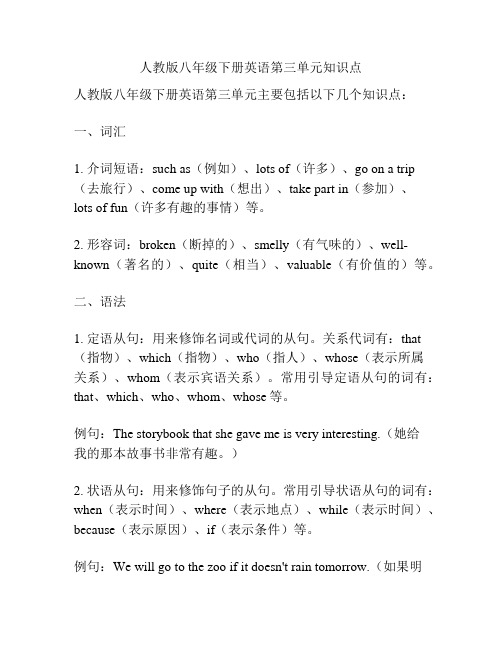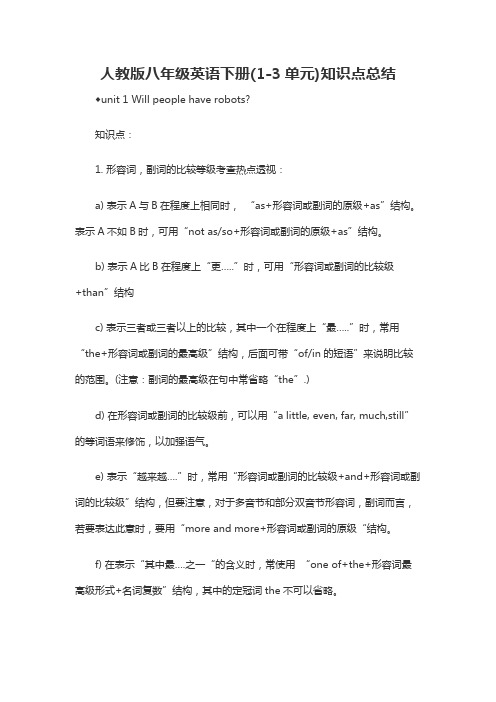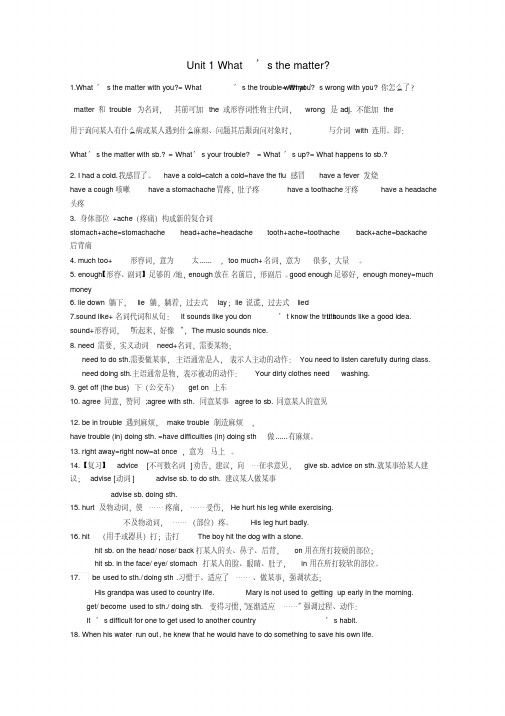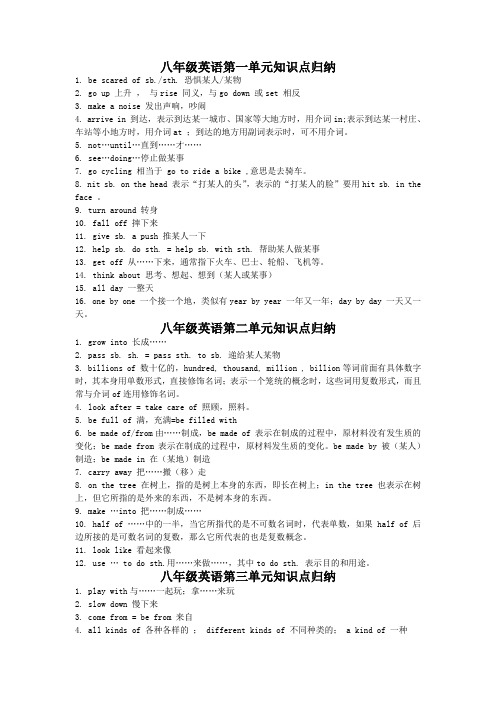最新人教版版八年级下册英语一至三单元知识点
最全面人教版八年级下册英语第一单元知识点归纳总结

Unit 1 What's the matter?一、词汇与短语◆重点单词A部分1.matter n. 问题;事情2.sore adj. 疼痛的;酸痛的3.stomachache n. 胃痛;腹痛4.foot n. 脚;足5.neck n. 颈;脖子6.stomach n. 胃;腹部7.throat n. 咽喉;喉咙8.hurt v. (使)疼痛;受伤9.fever n. 发烧10.passenger n. 乘客;旅客11.lie v. 躺;平躺12.break n. 间歇;休息13.rest v. &n. 放松;休息14.onto prep. 向;朝15.X-ray n. X射线;X光16.trouble n. 问题;苦恼17.toothache n. 牙痛18.hit n. (用手或器具)击;打19.headache n. 头痛20.herself pron. (she的反身代词)她自己21.off adv. & prep. 离开(某处);不工作;从……去掉B部分1.bandage n. 绷带v. 用绷带包扎2.press v. 压;挤;按3.sick adj. 生病的;有病的4.knee n. 膝;膝盖5.breathe v. 呼吸6.knife n. 刀7.sunburned adj. 晒伤的8.blood n. 血9.ourselves pron. (we反身代词)我们自己10.mean v. 意思是;打算11.climber n. 登山者;攀登者12.importance n. 重要性;重要13.risk n.&v. 危险;风险;冒险14.decision n. 决定;抉择15.accident n.(交通)事故;意外遭遇16.control v.&n. 限制;约束;管理17.situation n. 情况;状况18.spirit n. 勇气;意志19.kilo( = kilogram) n. 千克;公斤20.death n. 死;死亡21.rock n. 岩石22.nurse n. 护士◆重点短语A部分1.have a cold 感冒2.lie down 躺下3.have a stomachache 胃痛4.take one's temperature 量体温5.have a fever 发烧6.to one's surprise 使……惊讶的是7.get off 下车8.right away 立即;马上9.take breaks (take a break) 休息10.talk too much 说得太多11.drink enough water 喝足够的水12.have a very sore throat 嗓子非常疼13.get an X-ray 拍X光片14.see a dentist 看牙医15.drink some hot tea with honey 喝一些加蜂蜜的热茶16.put some medicine on sth.在……上面敷一些药17.feel very hot 感到很热18.sound like 听起来像19.all weekend 整个周末20.in the same way 以同样的方式21.go to a doctor 看医生22.go along 沿着……走23.on the side of the road 在马路边24.shout for help 大声呼救25.without thinking twice 没有多想26.have a heart problem 有心脏病27.thanks to 多亏了;由于28.in time 及时29.save a life 挽救生命30.get into trouble 陷入麻烦31.hurt oneself 受伤32.fall down落下;摔倒B部分1.be used to 习惯于……;适应于……2.in a difficult situation 在困境中3.take risks (take a risk) 冒险4.keep on doing sth. 继续(或坚持)做某事5.run out (of) 用尽;耗尽6.make a decision 作出决定7.cut off 切除8.get hit on the head 撞到头部9.get out of 离开;从……岀来10.be interested in 对……感兴趣11.give up 放弃12.mean doing sth. 意味着做某事13.put a bandage on sth. 用绷带包扎…14.lose one's life 失去生命15.feel sick 感到恶心16.mountain climbing 登山运动17.have problems breathing 呼吸困难18.be in control of 掌管;管理◆重点句子A部分1.What's the matter with you?=What's the trouble with you?=What's wrong with you?你怎么了?2.What should she do? 她该怎么办呢?3.Did you fall down? 你跌倒了吗?4.Should I take my temperature? 我应该量一下体温吗?5.I think I sat in the same way for too long without moving.我想我以同样的姿势一动不动地坐得太久了。
最新人教版八年级英语下册第一单元知识点汇总

最新人教版八年级英语下册第一单元知识点汇总Unit 1 What’s the matter?一、基础知识1.我感冒了。
可以表达为I had a cold、catch a cold或have the flu。
have a fever表示发烧,have a cough表示咳嗽,have a stomachache或肚子疼表示胃疼,have a toothache表示牙疼,have a headache表示头疼。
2.将身体部位和ache(疼痛)结合起来构成新的复合词,如stomach+ache=stomachache,head+ache=headache,tooth+ache=toothache,back+ache=backache,表示相应的疼痛。
3.“怎么啦?出什么事情了?”可以表达为What’ s the matter。
也可以用What’ s the trouble with you?或What’ s wrong with you。
matter和trouble为名词,其前可加the或形容词性物主代词,而wrong是形容词不能加the。
用于询问某人有什么病或遇到什么麻烦、问题,其后跟询问对象时,与介词with连用,如What’s the matter with sb。
= What’s your trouble?= What’s up?= What happens to sb。
举例来说,当问到“What’s the matter with you?”时,回答可以是“I have a bad cold.”4.maybe表示“或许”,常用于句首,表示可能性,后加句子。
例如Maybe you are right。
may be是情态动词+be的结构,意为“可能,也许”,后加名词、代词或形容词。
例如He maybe angry。
sound like可以和名词、代词以及从句结合使用,如It sounds like you don’t know the truth.It sounds like a good idea。
人教版八年级下册英语第三单元知识点

人教版八年级下册英语第三单元知识点人教版八年级下册英语第三单元主要包括以下几个知识点:一、词汇1. 介词短语:such as(例如)、lots of(许多)、go on a trip (去旅行)、come up with(想出)、take part in(参加)、lots of fun(许多有趣的事情)等。
2. 形容词:broken(断掉的)、smelly(有气味的)、well-known(著名的)、quite(相当)、valuable(有价值的)等。
二、语法1. 定语从句:用来修饰名词或代词的从句。
关系代词有:that (指物)、which(指物)、who(指人)、whose(表示所属关系)、whom(表示宾语关系)。
常用引导定语从句的词有:that、which、who、whom、whose等。
例句:The storybook that she gave me is very interesting.(她给我的那本故事书非常有趣。
)2. 状语从句:用来修饰句子的从句。
常用引导状语从句的词有:when(表示时间)、where(表示地点)、while(表示时间)、because(表示原因)、if(表示条件)等。
例句:We will go to the zoo if it doesn't rain tomorrow.(如果明天不下雨,我们会去动物园。
)3. 强调句型:强调句型是通过使用强调副词或者借助强调式动词来强调某一部分内容。
例句:It was Alice who won the first prize in the speech contest.(是爱丽丝在演讲比赛中获得了第一名。
)三、阅读技巧1. 根据上下文推测词义:通过上下文的提示来推测生词的词义。
2. 找出关键句:在一篇文章中,找出关键句可以帮助我们更好地理解文章的主旨。
3. 圈点标记:在阅读过程中进行圈点标记,可以帮助我们更好地理解文章,并且方便日后复习。
人教版八年级英语下册(1-3单元)知识点总结

人教版八年级英语下册(1-3单元)知识点总结◆unit 1 Will people have robots?知识点:1. 形容词,副词的比较等级考查热点透视:a) 表示A与B在程度上相同时,“as+形容词或副词的原级+as”结构。
表示A不如B时,可用“not as/so+形容词或副词的原级+as”结构。
b) 表示A比B在程度上“更…..”时,可用“形容词或副词的比较级+than”结构c) 表示三者或三者以上的比较,其中一个在程度上“最…..”时,常用“the+形容词或副词的最高级”结构,后面可带“of/in的短语”来说明比较的范围。
(注意:副词的最高级在句中常省略“the”.)d) 在形容词或副词的比较级前,可以用“a little, even, far, much,still”的等词语来修饰,以加强语气。
e) 表示“越来越….”时,常用“形容词或副词的比较级+and+形容词或副词的比较级”结构,但要注意,对于多音节和部分双音节形容词,副词而言,若要表达此意时,要用“more and more+形容词或副词的原级“结构。
f) 在表示“其中最….之一“的含义时,常使用“one of+the+形容词最高级形式+名词复数”结构,其中的定冠词the不可以省略。
g) 如果强调“两者中比较…的(一个)”的意思时,可使用“the+形容词比较级+其它”结构。
h) 表示“越….越….”, 可使用“the+形容词或副词的比较级,the+形容词或副词的比较级”结构。
2 .一般将来时a) 一般将来时的构成:由助动词shall或will加动词原形构成,shall用于第一人称。
在口语中,will在名词或代词后常简略为’ll,will not常简略为won’t。
这个时态的肯定,否定和疑问结构可表示如下:肯定句否定句疑问句I (We)shall(will) go.You(He, She, They) will go. I(We)shall(will) not go.You(He, She, They)will not go. Shall I(we) go?Will you (he, she, they) go?用”be going to +动词原形”也可表示将来时,表示将要发生的事,打算或决定要做的事。
新人教版英语八年级下册第一单元知识点归纳

【导语】下⾯是为您整理的新⼈教版英语⼋年级下册第⼀单元知识点归纳,仅供⼤家参考。
Unit 1 What’s the matter?⼀、基础知识1. What’ s the matter? 怎么啦?出什么事情了?【解析】matter/ ' mætə(r)) /n.问题;事情What’ s the matter with you?= What’s the trouble with you? = What’ s wrong with you? 你怎么了?【注】: matter 和trouble 为名词,其前可加the 或形容词性物主代词,wrong 是adj. 不能加the【⽤法】⽤于询问某⼈有什么病或某⼈遇到什么⿇烦、问题其后跟询问对象时,与介词with连⽤。
即:What’s the matter with sb.? = What’s your trouble? = What’s up? = What happens to sb.?— What’s the matter with you ? — I have a bad cold.2. I had a cold.我感冒了。
have a cold=catch a cold=have the flu感冒have a fever 发烧 have a cough咳嗽 have a stomachache胃疼,肚⼦疼 have a toothache⽛疼 have a headache头疼3. ⾝体部位+ache(疼痛)构成新的复合词stomach+ache=stomachache head+ache=headache tooth+ache=toothache back+ache=backache后背痛4. much too+ 形容词,意为太...... ,too much+名词,意为很多,⼤量。
5. enough【形容、副词】⾜够的/地,enough放在名前后,形副后。
八年级下册英语一到三单元知识点

八年级下册英语一到三单元知识点那咱开始!一单元知识点。
1. 一般将来时。
- 这可是个重要的时态哦!表示将来要发生的动作或存在的状态。
常见的结构有“will + 动词原形”和“be going to + 动词原形”。
比如说,“I will go to Beijing next week.”(我下周要去北京。
)“He is going to have a party tomorrow.”(他明天要开个派对。
)- 要注意哦,will 比较随意,be going to 通常是有计划、有打算的。
2. 短语大集合。
- fall down (摔倒)想象一下,像个大冬瓜“扑通”一下倒地上。
- look for (寻找)别和 find 搞混啦,find 是“找到”,look for 是还在努力找的过程。
- in the future (在未来)未来嘛,充满了神秘和可能!二单元知识点。
1. 情态动词 could。
- could 这个小家伙,语气比 can 更委婉、更客气。
“Could you please help me?”(你能帮帮我吗?)比“Can you please help me?”听起来更有礼貌。
- 还有,could 还能是 can 的过去式,表示过去的能力。
2. 动词短语。
- cheer up (使高兴;使振奋)就像给心情打了一针兴奋剂!- give out (分发;散发)把东西一个一个发出去。
- come up with (想出;提出)脑袋里突然蹦出个好主意。
3. 感叹句。
- What + (a/an) + 形容词 + 名词 + (主语 + 谓语)!“What a beautiful flower!”(多美的花啊!)- How + 形容词/副词 + (主语 + 谓语)!像“How fast he runs!”(他跑得多快啊!)1. 过去进行时。
- 这是在讲过去某个时刻正在进行的动作。
结构是“was/were + 动词的现在分词”。
最新人教版八年级下册英语unit1-unit3单元知识点

Unit 1 What’s the matter?= What’ s wrong with you? 你怎么了?1.What’ s the matter with you?= What’s the trouble with you?matter 和trouble 为名词,其前可加the 或形容词性物主代词,wrong 是adj. 不能加the用于询问某人有什么病或某人遇到什么麻烦、问题其后跟询问对象时,与介词with连用。
即:What’s the matter with sb.? =What’s your trouble? = What’s up? = What happens to sb.?2. I had a cold.我感冒了。
have a cold=catch a cold=have the flu感冒have a fever 发烧have a cough咳嗽have a stomachache胃疼,肚子疼have a toothache牙疼have a headache 头疼3. 身体部位+ache(疼痛)构成新的复合词stomach+ache=stomachache head+ache=headache tooth+ache=toothache back+ache=backache后背痛4. much too+ 形容词,意为太...... ,too much+名词,意为很多,大量。
5. enough【形容、副词】足够的/地,enough放在名前后,形副后。
good enough足够好,enough money=much money6. lie down躺下,lie 躺,躺着,过去式lay;lie说谎,过去式liedIt sounds like a good idea.7.sound like+名词代词和从句:It sounds like you don’t know the truth.sound+形容词,“听起来,好像”,The music sounds nice.8. need 需要,实义动词need+名词,需要某物;need to do sth.需要做某事,主语通常是人,表示人主动的动作:You need to listen carefully during class.need doing sth.主语通常是物,表示被动的动作:Your dirty clothes need washing.9. get off (the bus) 下(公交车)get on 上车10. agree 同意,赞同;agree with sth. 同意某事agree to sb. 同意某人的意见12. be in trouble遇到麻烦,make trouble 制造麻烦,have trouble (in) doing sth. =have difficulties (in) doing sth做......有麻烦。
人教版八年级下册英语知识点总结(最新最全)

八年级英语第一单元知识点归纳1. be scared of sb./sth. 恐惧某人/某物2. go up 上升,与rise 同义,与go down 或set 相反3. make a noise 发出声响,吵闹4. arrive in 到达,表示到达某一城市、国家等大地方时,用介词in;表示到达某一村庄、车站等小地方时,用介词at ;到达的地方用副词表示时,可不用介词。
5. not…until…直到……才……6. see…doing…停止做某事7. go cycling 相当于 go to ride a bike ,意思是去骑车。
8. nit sb. on the head 表示“打某人的头”,表示的“打某人的脸”要用hit sb. in the face 。
9. turn around 转身10. fall off 摔下来11. give sb. a push 推某人一下12. help sb. do sth. = help sb. with sth. 帮助某人做某事13. get off 从……下来,通常指下火车、巴士、轮船、飞机等。
14. think about 思考、想起、想到(某人或某事)15. all day 一整天16. one by one 一个接一个地,类似有year by year 一年又一年;day by day 一天又一天。
八年级英语第二单元知识点归纳1. grow into 长成……2. pass sb. sh. = pass sth. to sb. 递给某人某物3. billions of 数十亿的,hundred, thousand, million , billion等词前面有具体数字时,其本身用单数形式,直接修饰名词;表示一个笼统的概念时,这些词用复数形式,而且常与介词of连用修饰名词。
4. look after = take care of 照顾,照料。
5. be full of 满,充满=be filled with6. be made of/from由……制成,be made of 表示在制成的过程中,原材料没有发生质的变化;be made from 表示在制成的过程中,原材料发生质的变化。
- 1、下载文档前请自行甄别文档内容的完整性,平台不提供额外的编辑、内容补充、找答案等附加服务。
- 2、"仅部分预览"的文档,不可在线预览部分如存在完整性等问题,可反馈申请退款(可完整预览的文档不适用该条件!)。
- 3、如文档侵犯您的权益,请联系客服反馈,我们会尽快为您处理(人工客服工作时间:9:00-18:30)。
Unit 1 What’s the matter?1.What’ s the matter with you?= What’s the trouble with you?= What’ s wrong with you?你怎么了? matter 和trouble 为名词,其前可加the 或形容词性物主代词,wrong 是adj. 不能加the用于询问某人有什么病或某人遇到什么麻烦、问题其后跟询问对象时,与介词with连用。
即:What’s the matter with sb.? = What’s your trouble? = What’s up? = What happens to sb.?2. I had a cold.我感冒了。
have a cold=catch a cold=have the flu感冒 have a fever 发烧have a cough咳嗽 have a stomachache胃疼,肚子疼 have a toothache牙疼 have a headache头疼3. 身体部位+ache(疼痛)构成新的复合词stomach+ache=stomachache head+ache=headache tooth+ache=toothache back+ache=backache后背痛4. much too+ 形容词,意为太...... ,too much+名词,意为很多,大量。
5. enough【形容、副词】足够的/地,enough放在名前后,形副后。
good enough足够好,enough money=much money6. lie down躺下, lie 躺,躺着,过去式lay;lie说谎,过去式lied7.sound like+名词代词和从句:It sounds like you don’t know the truth. It sounds like a good idea. sound+形容词,“听起来,好像”,The music sounds nice.8. need 需要,实义动词need+名词,需要某物;need to do sth.需要做某事,主语通常是人,表示人主动的动作:You need to listen carefully during class. need doing sth.主语通常是物,表示被动的动作:Your dirty clothes need washing.9. get off (the bus) 下(公交车) get on 上车10. agree 同意,赞同;agree with sth. 同意某事agree to sb. 同意某人的意见12. be in trouble遇到麻烦,make trouble 制造麻烦,have trouble (in) doing sth. =have difficulties (in) doing sth做......有麻烦。
13. right away=right now=at once,意为马上。
14.【复习】 advice [不可数名词]劝告,建议,向…征求意见, give sb. advice on sth.就某事给某人建议; advise [动词] advise sb. to do sth. 建议某人做某事advise sb. doing sth.15. hurt 及物动词,使……疼痛,……受伤,He hurt his leg while exercising.不及物动词,……(部位)疼。
His leg hurt badly.16. hit (用手或器具)打;击打 The boy hit the dog with a stone.hit sb. on the head/ nose/ back打某人的头、鼻子、后背,on用在所打较硬的部位;hit sb. in the face/ eye/ stomach 打某人的脸、眼睛、肚子,in用在所打较软的部位。
17. be used to sth./ doing sth.习惯于、适应了……、做某事,强调状态;His grandpa was used to country life. Mary is not used to getting up early in the morning.get/ become used to sth./ doing sth. “变得习惯,逐渐适应……”强调过程、动作:It’s difficult for one to get used to another country’s habit.18. When his water run out, he knew that he would have to do something to save his own life.物:sth. run out. 某物用尽了。
人:sb. run out of sth. 人用尽了某物。
He run out of all his money last night.19. risk (sb.) to do sth. 冒险去做某事 take a risk=take risks 冒险20. the importance of (doing) sth.(做)某事的重要性 We students should know the importance of (learning) English. importance n. 重要(性), important adj.重要的,unimportant adj.不重要的21.decision 【名词】决定;抉择; make a decision 做决定 ; make a decision to do sth.= decide to do sth. 。
22. be in the control of …掌管,管理 The headmaster is in the control of this new school.be out of control无法控制,无法管理 be under control被控制住,在控制之中23.mind意为介意,mind doing sth. 介意做某事, Would you mind my opening the window?24. give up (doi年g) sth. 放弃(做)某事,give up (playing) computer games;二、重点语法【用法】1. 可用作宾语,指的是宾语和主语表示同一个或同一些的人或事物。
如:Maria bought herself a scarf. We must look after ourselves very well.2. 可用作表语,指的是表语和主语表示同一个或同一些人或事物。
如:She isn’t quite herself today.3. 可用作主语或宾语的同位语,常用来加强语气。
如:She herself will fly to London tomorrow. I met the writer himself last week.4. 用在某些固定短语当中。
如: look after oneself / take care of oneself 照顾自己 teach oneself sth./ learn sth. by oneself自学enjoy oneself 玩得高兴,过得愉快 help oneself to sth 请自用……(随便吃/喝些……).hurt oneself摔伤自己 say to oneself自言自语 leave sb. by oneself把某人单独留下buy oneself sth.给自己买……东西 introduce oneself 介绍……自己提醒1. 反身代词不能单独做主语,但可以做主语的同位语,起强调作用。
如:我自己能完成作业。
(误)Myself can finish my homework. (正) I myself can finish my homework. / I can finish my homework myself.2. 反身代词表示“某人自己”不能表示“某人的东西”,因为它没有所有格的形式。
表达“某人自己的(东西)”时,须要用one’s own. 如:我用我自己的蜡笔画画。
(误)I’m drawing with myself crayons. (正) I’m drawing with my own crayons.Unit 2 I’ll help to clean up the city parks一、基本知识点1. sick 生病的,有病的;可在句中作表语Mary could not come because she is sick. 也可作定语a sick child【区别ill】ill与sick同义;但是只在句中做表语,不做定语。
Mary could not come because she is ill.2. cheer (sb.) up(让某人)变得高兴;振奋起来The good news cheered up everyone in our class.3. give out分发;散发=hand out.The teacher is giving out/ handing out the test papers.give sth. out to sb. 意为把某物分发给某人4. volunteer【名词】志愿者【动词】义务做,自愿做(某事)volunteer to do sth. \自愿做某事,The girls could volunteer in an after-school study program.5. used to do sth.过去/曾经(常)做某事,表示过去的习惯、动作或状态,并强调现在已经不再存在或发生。
There used to be a cinema here. 这里曾有一个照相机。
They told me stories about the past and how things used to be. 他们告诉我关于这里过去的故事。
6. alone【形容词】独自一人的,无感情色彩:The musician enjoyed living alone and writing songs himself.lonely(感到)孤独寂寞的,带有很强的感情色彩,可做表语或定语。
The lonely boy is not lonely now.7. care for sb./sth.照顾;照料……care【名词】小心,关心take care of=look after →【动词】care about sb./sth.关心,在意某人/事→【形容词】careful 仔细的/ careless 粗心的→【副词】carefully 仔细地8. such“这样的,这种,如此”,用于修饰名词such+ a/ an+形容词+单数名词:such a good day 多么美好的一天/such an exciting match 多么精彩的比赛such+形容词+复数名词/不可数名词:such important decisions多么重要的建议such delicious food多么美味的食物如果名词前被many, much, few, little修饰时,只能用so,而不用such:so many sick children/ so little time9. try out for…参加选拔,争取成为…Thirty football players tried out for the Best Player of the year. try out试用,试验10. journey(尤指长途)旅行行程;trip多指短途旅行;travel travel around the world →【名词】traveler旅行者11.【复习】be busy with sth. 忙于(做)什么事情be busy doing sth. 忙于(做)什么事情12. try doing sth. 试着去做某事try to do sth. 尽力去做某事try one’s best (to do sth.) 尽某人最大的努力去做某事13.【复习】be worried about sb./ sth. = worry about sb./ sth. 担心某人、某事14. raise money集资,筹钱;raise money for…为……筹钱raise【动词】举起;提高;募集15. keep【动词】keep+名词,保留(某物);keep+形容词,保持16.【形容词】broken破损的,出毛病的;blind瞎的,失明的;deaf聋的;disabled有残疾的,丧失能力的;在句中做定语和表语。
